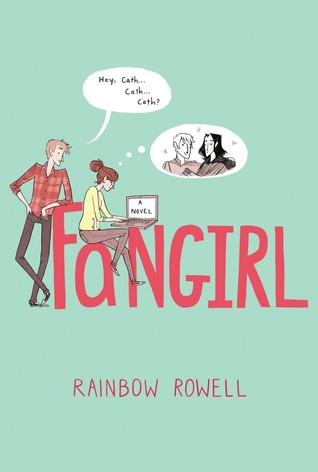Introverted Cath isn’t the most well-adjusted, outgoing teen in Nebraska, but she knows where she stands. With her mother gone and her father a little flighty, Cath keeps an eye on things at home. Her twin sister Wren is her best friend. And the rest of her life and livelihood is Simon Snow – specifically, her life is Carry On, Simon the epic, episodic work of fan fiction Cath writes for an audience of thousands of Simon fans around the world.
College upsets everything. Cath worries about her father and his empty nest. Wren has a new roommate and a new weekend partying habit, while Cath’s roommate is older and eyes Cath’s Simon Snow posters suspiciously. Cath’s creative writing class isn’t what she hoped it would be, and she either has time for schoolwork or updating Carry On, Simon, but not both. It’s awful. But she has to deal with it. Or drop out. Or fall in love. Or not.
There are a lot of conversations you could have about Rainbow Rowell’s Fangirl.
– You could talk about whether or not Fangirl is YA, or whether or not any book set in college could be considered YA.
– You could talk about if a character’s Internet-Life can be adequately and richly portrayed with prose, and whether or not Rowell did Cath’s fandom any justice.
– Rowell includes excerpts from Cath’s fan fiction as well as from Simon books themselves – you could talk about fiction within fiction… or more accurately, fiction-based-on-other-fiction all within fiction. Yikes.
– You could talk about “slice of life” fiction. Is it boring? Is it realistic? Is it an artistic form or a mark of authorial laziness? I
– If you are an introverted English major who somehow survived college feeling a little beaten and bruised – come on, I know most of you probably are – then you could talk about how Rowell must have been spying on you in your dorm room, subsisting on the cereal bars stashed in your dresser drawers rather than think of stepping into the school cafeteria.
I could write a blog post on any of those topics, but I believe I would need an entire post for each question. Maybe more. I know this blog has taken some strange turns over the years, but I’m not about to start a Rainbow Rowell Literary Analysis Only blog. Or, A Dramatic Retelling of My College Experience blog for that matter.
However, I would like to propose a theory to you, my few and amazing readers: the more discussion a book raises, the better the book. The more questions you have, the better the book. The more different angles you can come at a book, the better the book.
Obviously, this is not a hard and fast rule, but think about it next time you finish a book. Does the ending wrap itself up in a bow? Can you see where the plot is leading you at every turn? Do you understand every narrative decision the author made? Do you agree with every narrative decision the author made?
It’s nice to read a tidy book, but a tidy book is usually a safe book. Rowell’s narration is pitch perfect and yes, there is a fairly traditional romance plot, but I would argue that this is not a safe book. It’s a book you can critique. A book you can dissect. It’s a book you can love, but makes you think about why you love it.
I should also mention: I loved it. Loved it hard. Didn’t want it to end. It’s been years since I’ve added an author to my Must Read List, but welcome aboard, Ms. Rowell.
